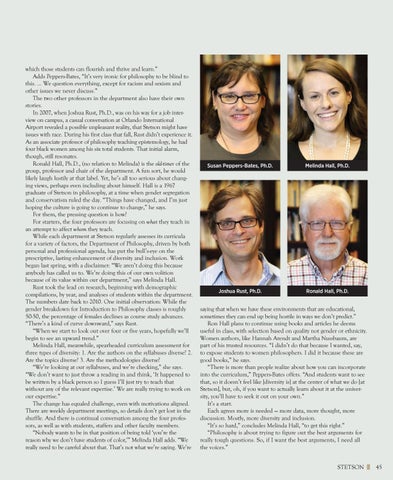which those students can flourish and thrive and learn.” Adds Peppers-Bates, “It’s very ironic for philosophy to be blind to this. … We question everything, except for racism and sexism and other issues we never discuss.” The two other professors in the department also have their own stories. In 2007, when Joshua Rust, Ph.D., was on his way for a job interview on campus, a casual conversation at Orlando International Airport revealed a possible unpleasant reality, that Stetson might have issues with race. During his first class that fall, Rust didn’t experience it. As an associate professor of philosophy teaching epistemology, he had four black women among his six total students. That initial alarm, though, still resonates. Ronald Hall, Ph.D., (no relation to Melinda) is the old-timer of the group, professor and chair of the department. A fun sort, he would likely laugh lustily at that label. Yet, he’s all too serious about changing views, perhaps even including about himself. Hall is a 1967 graduate of Stetson in philosophy, at a time when gender segregation and conservatism ruled the day. “Things have changed, and I’m just hoping the culture is going to continue to change,” he says. For them, the pressing question is how? For starters, the four professors are focusing on what they teach in an attempt to affect whom they teach. While each department at Stetson regularly assesses its curricula for a variety of factors, the Department of Philosophy, driven by both personal and professional agenda, has put the bull’s-eye on the prescriptive, lasting enhancement of diversity and inclusion. Work began last spring, with a disclaimer: “We aren’t doing this because anybody has called us to. We’re doing this of our own volition because of its value within our department,” says Melinda Hall. Rust took the lead on research, beginning with demographic compilations, by year, and analyses of students within the department. The numbers date back to 2010. One initial observation: While the gender breakdown for Introduction to Philosophy classes is roughly 50-50, the percentage of females declines as course study advances. “There’s a kind of curve downward,” says Rust. “When we start to look out over four or five years, hopefully we’ll begin to see an upward trend.” Melinda Hall, meanwhile, spearheaded curriculum assessment for three types of diversity: 1. Are the authors on the syllabuses diverse? 2. Are the topics diverse? 3. Are the methodologies diverse? “We’re looking at our syllabuses, and we’re checking,” she says. “We don’t want to just throw a reading in and think, ‘It happened to be written by a black person so I guess I’ll just try to teach that without any of the relevant expertise.’ We are really trying to work on our expertise.” The change has equaled challenge, even with motivations aligned. There are weekly department meetings, so details don’t get lost in the shuffle. And there is continual conversation among the four professors, as well as with students, staffers and other faculty members. “Nobody wants to be in that position of being told ‘you’re the reason why we don’t have students of color,’” Melinda Hall adds. “We really need to be careful about that. That’s not what we’re saying. We’re
Susan Peppers-Bates, Ph.D.
Melinda Hall, Ph.D.
Joshua Rust, Ph.D.
Ronald Hall, Ph.D.
saying that when we have these environments that are educational, sometimes they can end up being hostile in ways we don’t predict.” Ron Hall plans to continue using books and articles he deems useful in class, with selection based on quality not gender or ethnicity. Women authors, like Hannah Arendt and Martha Nussbaum, are part of his trusted resources. “I didn’t do that because I wanted, say, to expose students to women philosophers. I did it because these are good books,” he says. “There is more than people realize about how you can incorporate into the curriculum,” Peppers-Bates offers. “And students want to see that, so it doesn’t feel like [diversity is] at the center of what we do [at Stetson], but, oh, if you want to actually learn about it at the university, you’ll have to seek it out on your own.” It’s a start. Each agrees more is needed — more data, more thought, more discussion. Mostly, more diversity and inclusion. “It’s so hard,” concludes Melinda Hall, “to get this right.” “Philosophy is about trying to figure out the best arguments for really tough questions. So, if I want the best arguments, I need all the voices.” STETSON
45
